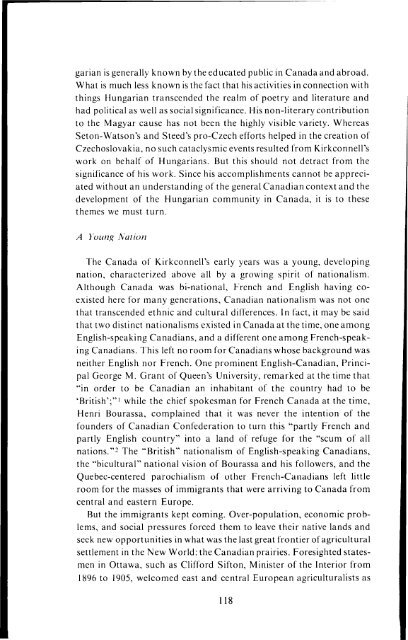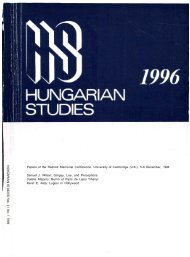garian is generally known by the educated public in Canada and abroad.What is much less known is the fact that his activities in connection withthings <strong>Hungarian</strong> transcended the realm <strong>of</strong> poetry and literature andhad political as well as social significance. His non-literary contributionto the Magyar cause has not been the highly visible variety. WhereasSeton-Watson's and Steed's pro-Czech efforts helped in the creation <strong>of</strong>Czechoslovakia, no such cataclysmic events resulted from Kirkconnell'swork on behalf <strong>of</strong> <strong>Hungarian</strong>s. But this should not detract from thesignificance <strong>of</strong> his work. Since his accomplishments cannot be appreciatedwithout an understanding <strong>of</strong> the general <strong>Canadian</strong> context and thedevelopment <strong>of</strong> the <strong>Hungarian</strong> community in Canada, it is to thesethemes we must turn.A YoungNation<strong>The</strong> Canada <strong>of</strong> Kirkconnell's early years was a young, developingnation, characterized above all by a growing spirit <strong>of</strong> nationalism.Although Canada was bi-national, French and English having coexistedhere for many generations, <strong>Canadian</strong> nationalism was not onethat transcended ethnic and cultural differences. In fact, it may be saidthat two distinct nationalisms existed in Canada at the time, one amongEnglish-speaking <strong>Canadian</strong>s, and a different one among French-speaking<strong>Canadian</strong>s. This left no room for <strong>Canadian</strong>s whose background wasneither English nor French. One prominent English-<strong>Canadian</strong>, PrincipalGeorge M. Grant <strong>of</strong> Queen's University, remarked at the time that"in order to be <strong>Canadian</strong> an inhabitant <strong>of</strong> the country had to be'British';" 1 while the chief spokesman for French Canada at the time,Henri Bourassa, complained that it was never the intention <strong>of</strong> thefounders <strong>of</strong> <strong>Canadian</strong> Confederation to turn this "partly French andpartly English country" into a land <strong>of</strong> refuge for the "scum <strong>of</strong> allnations." 2 <strong>The</strong> "British" nationalism <strong>of</strong> English-speaking <strong>Canadian</strong>s,the "bicultural" national vision <strong>of</strong> Bourassa and his followers, and theQuebec-centered parochialism <strong>of</strong> other French-<strong>Canadian</strong>s left littleroom for the masses <strong>of</strong> immigrants that were arriving to Canada fromcentral and eastern Europe.But the immigrants kept coming. Over-population, economic problems,and social pressures forced them to leave their native lands andseek new opportunities in what was the last great frontier <strong>of</strong> agriculturalsettlement in the New World: the <strong>Canadian</strong> prairies. Foresighted statesmenin Ottawa, such as Clifford Sifton, Minister <strong>of</strong> the Interior from1896 to 1905, welcomed east and central European agriculturalists as
the best possible settlers who would in time create prosperous farms out<strong>of</strong> the prairie wilderness.<strong>The</strong> appearance in the <strong>Canadian</strong> West <strong>of</strong> large groups <strong>of</strong> strangelydressed people with stranger names, speaking unintelligible languagesand following alien traditions, alarmed many English <strong>Canadian</strong>s, justas their influx alarmed Bourassa. Was Western Canada destined to bedominated by people incapable <strong>of</strong> adjusting to <strong>Canadian</strong> traditions anddeveloping loyalty to <strong>Canadian</strong> institutions and government? Suchfears, expressions <strong>of</strong> nativistic antagonisms towards the immigrants,were rampant in the <strong>Canadian</strong> West. <strong>The</strong> First World War, a conflictwhich raised human emotions to unprecedented heights, served toreinforce these hatreds, especially toward immigrants who came fromthe lands <strong>of</strong> the Central Powers. During the war, these newcomers weredesignated as "enemy aliens". Because Austria-Hungary was one <strong>of</strong> theprincipal Central Powers, <strong>Hungarian</strong>-<strong>Canadian</strong>s fell into this category.<strong>The</strong> hatreds caused by the war were still not forgotten when Canadaplunged into one <strong>of</strong> the worst crises <strong>of</strong> its domestic history, the GreatDepression. Starting in 1929, the crash caused unparalleled hardshipsfor most <strong>Canadian</strong>s. During the worst years <strong>of</strong> the economic crisis oneout <strong>of</strong> every four adults was unemployed. Thousands <strong>of</strong> worried menwended their way through the country, going from factory to factory,mine to mine, seeking non-existent jobs. Prairie farmers were also badlyhurt. <strong>The</strong> price <strong>of</strong> farm products hit all time lows. In 1932, wheat soldfor only 32 cents a bushel, its lowest price in centuries. 3 <strong>The</strong> drop in farmincome was aggravated by a series <strong>of</strong> natural disasters. For many years,severe drought plagued the southern portions <strong>of</strong> Alberta and Saskatchewan,causing not only near-total crop failures, but also and moreimportantly, soil erosion. <strong>The</strong> drought, the soil erosion and othernatural calamities such as grasshoppers caused nine successive years <strong>of</strong>almost total crop failures in some areas <strong>of</strong> the prairies. 4 <strong>The</strong> chronic andnation-wide unemployment, the collapse <strong>of</strong> the West's farm economy,resulted in a bitter competition for jobs and all means <strong>of</strong> income, astruggle in which newcomers <strong>of</strong>ten ended up as losers.<strong>The</strong> Depression was hardly over when the Second World War began.<strong>The</strong> emotional strain <strong>of</strong> the conflict rekindled some <strong>of</strong> the prejudicesbuilt up during the First World War. Hungary again found herself in thecamp at war with Canada. Nevertheless, during this war the lot <strong>of</strong><strong>Hungarian</strong>-<strong>Canadian</strong>s was better than it had been during 1914 18. <strong>The</strong>Second World War was followed by the Cold War. Fortunately, thedomestic situation, while not free from economic recessions accompaniedby unemployment, brought much greater economic security for
- Page 1 and 2: Canadian-American Review of Hungari
- Page 3 and 4: Canadian-American Review of Hungari
- Page 5 and 6: Canadian-American Review of Hungari
- Page 7: Canadian-American Review of Hungari
- Page 11 and 12: than a decade later they were follo
- Page 13 and 14: Sociologists have yet to explain sa
- Page 15: fifteen minutes, and spent the rest
- Page 18 and 19: from the "Canadian poetry" of Icela
- Page 20 and 21: garian community of Western Canada,
- Page 22 and 23: lowed translations from other, more
- Page 24 and 25: which took place in the pages of th
- Page 27 and 28: from teaching in 1968, Kirkconnell
- Page 29 and 30: Magyar poets and writers to the rea
- Page 31 and 32: tive of his helpful attitude and un
- Page 33: 33. Kirkconnell, A Slice of Canada,
- Page 36 and 37: The groaning of the slaves on Egypt
- Page 38 and 39: ecause most such lines are imbedded
- Page 40 and 41: ;Two spheres contend with one anoth
- Page 42 and 43: matched it to this feeble hurdy-gur
- Page 44 and 45: NOTES1. The only full-length study
- Page 46 and 47: terest in Hungarian literature, has
- Page 48 and 49: limitations of Bowring and others:
- Page 50 and 51: Jones' Five Hungarian WritersJ 4 Su
- Page 53 and 54: REVIEW ARTICLEHungarian Poetry in E
- Page 55 and 56: ooks written in English. A table of
- Page 57 and 58: passive, or into noun phrases in En
- Page 59 and 60:
REVIEW ARTICLEHungarian Religious P
- Page 61 and 62:
magas és a mély magánhangzójú
- Page 63 and 64:
SPECIAL SECTIONToldiAn Epic Poem (1
- Page 65 and 66:
CANTO ONE"He lifted, with one hand,
- Page 67 and 68:
"Who should be squire of this whole
- Page 69 and 70:
What meant this hubbub in a widow's
- Page 71 and 72:
"Lad, here's your share! Don't say
- Page 73 and 74:
The heavy stone flies on: where wil
- Page 75 and 76:
The homes of moorhen, plover, gull
- Page 77 and 78:
Perhaps I'll shed my blood, some no
- Page 79 and 80:
CANTO FIVENicholas went wandering a
- Page 81 and 82:
Her tongue was like a coulter in th
- Page 83 and 84:
Rosemary pots mourned on its window
- Page 85 and 86:
Such were her words. No more would
- Page 87 and 88:
As if a nest of hornets rose to sti
- Page 89 and 90:
Upon an isle, by a Czech's hand the
- Page 95 and 96:
REVIEW ARTICLEQuo Vadis Transylvani
- Page 97 and 98:
Hungarians in Rumania in terms of t
- Page 99 and 100:
down by serious shortcomings in bot
- Page 101 and 102:
alanced presentation of the Vienna
- Page 104 and 105:
talent enables Wass to depict the s
- Page 106 and 107:
Carpathian Federation, and printed
- Page 108 and 109:
Now and then, however, this rule de
- Page 110 and 111:
temper such an indictment by recogn
- Page 112 and 113:
OUR CONTRIBUTORS (continued from pa
- Page 115:
TO THOSE WISHING TO SUBMIT MANUSCRI
















